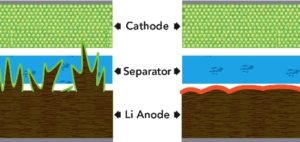Menlo Park, Calif. — In a study that could improve the safety of next-generation batteries, researchers discovered that adding two chemicals to the electrolyte of a lithium metal battery prevents the formation of dendrites – “fingers” of lithium that pierce the barrier between the battery’s halves, causing it to short out, overheat and sometimes burst into flame.
The findings, published June 17 in Nature Communications, could help remove a major barrier to developing lithium-sulfur and lithium-air batteries, promising future technologies that could store up to 10 times more energy per weight than batteries now used in consumer electronics and electric cars.
“Because these batteries would be much lighter than today’s rechargeable batteries, they have a lot of potential for extended-range electric vehicles,” said Yi Cui, an associate professor at Stanford University and the Department of Energy’s SLAC National Accelerator Laboratory. “But one of the things that’s been holding them back is their tendency to form dendrites, which are also the culprit behind overheating and occasional fires in today’s lithium-ion batteries.”
A New Approach to Safety
Dendrites form when a battery electrode degrades, and metal ions become deposited on the electrode’s surface. When those finger-like deposits elongate until they penetrate the barrier between the two halves of the battery, they can cause electrical shorts, overheating and fires.
In a previous study published last October, Cui and his colleagues reported that they had developed a “smart” lithium-ion battery that senses when dendrites start to puncture the barrier so the battery can be replaced before the situation becomes dangerous. This could offer a solution for millions of batteries now in use in cell phones, laptops and other devices, as well as in electric cars and airplanes.
The new research addresses battery technologies that haven’t reached the market yet, and it takes a different approach: adding chemicals to the electrolyte to prevent dendrite formation. One compound, lithium nitrate, has been under investigation for a long time as an additive to improve battery performance. The other, lithium polysulfide, has been considered a nuisance: Formed when a sulfur electrode degrades, it travels to the lithium metal electrode and wrecks it, Cui said.
In brainstorming sessions, the research team realized their combined effect had not been studied before; together the chemicals could potentially react with lithium metal to form a stable, solid interface between the electrode and the electrolyte.
For more detail: Research Points the way to Safer Lithium Batteries

